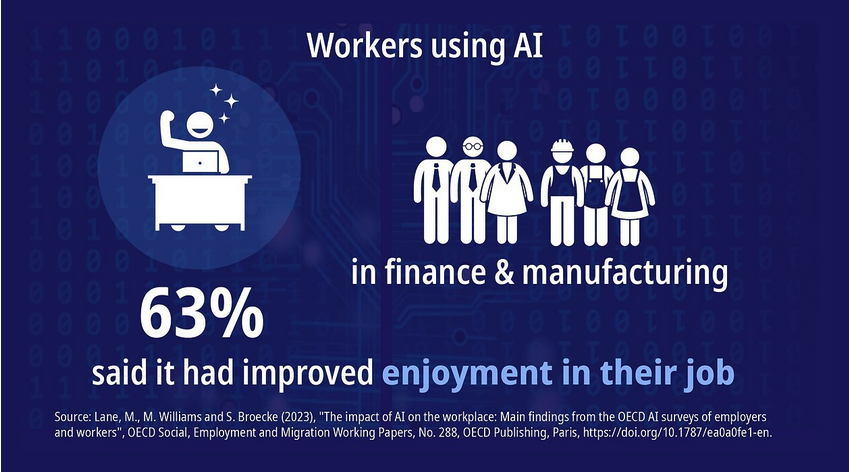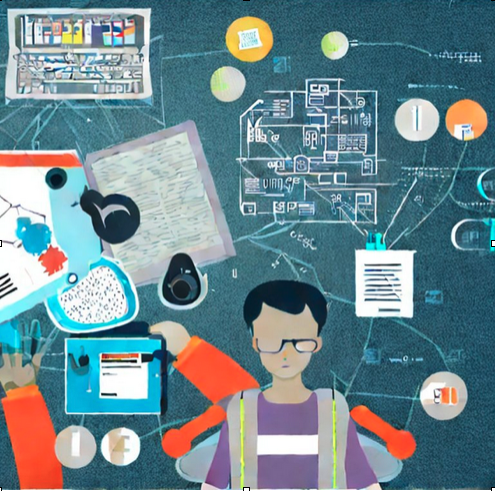
The OECD (Organisation for Economic Co-operation and Development) has recently released a comprehensive report on the 2023 Employment Outlook, shedding light on the influence of artificial intelligence (AI) on the workforce. The report, which includes a specific focus on AI and its implications for jobs, examines data collected in 2022 from the manufacturing and finance sectors across seven countries. While AI presents various positive outcomes in terms of job satisfaction, health, and wages, it also carries risks concerning privacy, work intensity, and bias. This blog post explores the findings and emphasizes the need for proactive policy actions to ensure a balanced and inclusive approach to AI integration in the workplace.
The Potential for an AI Revolution
Although the adoption of AI by firms is still relatively low, significant advancements, including the development of generative AI technologies like ChatGPT, falling costs, and the availability of AI-skilled workers, suggest that OECD countries are on the verge of an AI revolution. To fully understand the extent of this revolution, it is crucial to gather accurate and up-to-date data on AI adoption, its impact on job roles (such as changes, creation, or disappearance), and the shifting requirements for skills. Notably, when considering all forms of automation, including AI, approximately 27% of jobs fall within occupations at high-risk of automation. A OECD survey, undertaken in 2022, focusing on the manufacturing and finance sectors across seven countries, highlights both the opportunities and risks associated with AI.
Mitigating Potential Disruptions
To counteract any negative consequences and maintain the benefits that AI can bring to the workplace, it is important for countries to implement concrete policy actions that ensure the trustworthy use of AI while protecting workers' fundamental rights and well-being. Governments should strive to establish inclusive labor markets by leveraging AI as a supportive tool rather than a hindrance. Wage policies, such as minimum wages and collective bargaining, can help mitigate any losses in purchasing power. Additionally, direct support through tax and benefit systems can safeguard the net income of low-income households.
Adapting to Changing Skills Requirements
The rapid development and adoption of AI technology necessitate a shift in the required skill sets of the workforce. Some skills will become obsolete, while new ones will emerge, demanding a comprehensive approach to training and upskilling. It is crucial to offer training opportunities for both low-skilled and older workers, as well as higher-skilled individuals. Governments should encourage employers to provide adequate training, incorporate AI skills into educational curricula, and promote diversity within the AI workforce.
Occupations at High Risk
According to the OECD report, highly skilled jobs are at the highest risk of being impacted by AI-driven automation. These positions represent approximately 27% of employment across the OECD's 38 member countries, including nations such as the UK, Japan, Germany, the US, Australia, and Canada. Occupations in finance, medicine, and legal activities, which typically require extensive education and rely on accumulated experience, are particularly susceptible to automation by AI. Fields such as law, culture, science, engineering, and business are deemed highly exposed to AI-powered automation.
Tipping Point and Urgent Action
Recent AI breakthroughs, exemplified by advancements in ChatGPT and other AI tools, have demonstrated output indistinguishable from human counterparts. Consequently, major economies find themselves at a tipping point, where an AI revolution could fundamentally transform the workplace. The OECD emphasizes the urgent need for action in response to these rapid developments, accompanied by the decreasing costs of AI production and adoption.
Opportunities and Risks
The OECD's report on the 2023 Employment Outlook highlights both the potential opportunities and risks that AI presents to the workforce. While AI can enhance job satisfaction, health, and wages, concerns surrounding privacy, work intensity, and bias require careful attention. Proactive policy actions are necessary to ensure the responsible and inclusive use of AI in the workplace. Additionally, the need for upskilling and reskilling programs becomes imperative as AI continues to reshape the skills landscape. Governments, employers, and educational institutions must work together to navigate the AI revolution effectively, fostering a future where AI supports and empowers the workforce rather than replacing it.








